Getting Necessary Evidence From Non-Party Witnesses

In certain kinds of injury cases, it won’t be you the victim, or the Defendant that you’re suing, that may have all of the crucial evidence needed to prove your case or to prove the accident. It may be a third party—a company or person not involved in the accident, that could have information that a jury needs to hear during your trial.
You can certainly demand that the Defendant, who you are suing, turn over information about your case—things like documents, video surveillance, or other data. But that’s because they are a party to the lawsuit. What about these other companies or people that aren’t parties to the lawsuit? How do you get information that they have, but you need?
Subpoenas for Records and Information
One way is by serving a subpoena on them to appear and produce records, sometimes called a subpoena duces tecum.
This may be a full deposition where your attorney will sit down with the witness and ask him or her questions, while reviewing the documents the witness has provided that are relevant to your case. Other times, there may not be a full deposition, there may just be the production of records that the other side has.
Avoiding Destruction of Evidence
Loss or destruction of evidence by the nonparty can be a problem, not because they destroyed evidence maliciously, but because they had no idea the information was relevant to any type of pending claim or lawsuit. For example, many standard surveillance cameras automatically rewrite or re-record over themselves after a certain time period.
If the store that has the video isn’t told to preserve the video surveillance, and stop the rewrite, that video evidence could be lost forever. The same goes for emails, or incident reports, or anything else that a third party may have, but not know is relevant to a claim or lawsuit.
This is why it is so important to see a personal injury attorney quickly after your accident; the quicker you get to an attorney, the quicker the attorney can notify parties that they need to preserve and not destroy evidence.
Protective Orders and Trade Secrets
Getting evidence from non-parties presents another challenge as well: sometimes the things you need as evidence to prove your case, the non-party may consider private, privileged, or trade secrets. They may know that you need the information, but the information is sensitive and confidential. They have the right to go to court and ask for a protective order thus avoiding ever having to produce the information or evidence that you need.
In these cases, the judge will review the information and see if there is a way to redact or edit the documents or information to both protect the non-party, but also to allow the requesting party to access the evidence as well.
Call the Boston personal injury lawyers at The Law Office of Joseph Linnehan, Jr. today at 617-275-4200 for help with every step in your personal injury case.
Sources:
chancellor.berkeley.edu/are-there-different-types-subpoenas
investopedia.com/terms/t/trade-secret.asp
